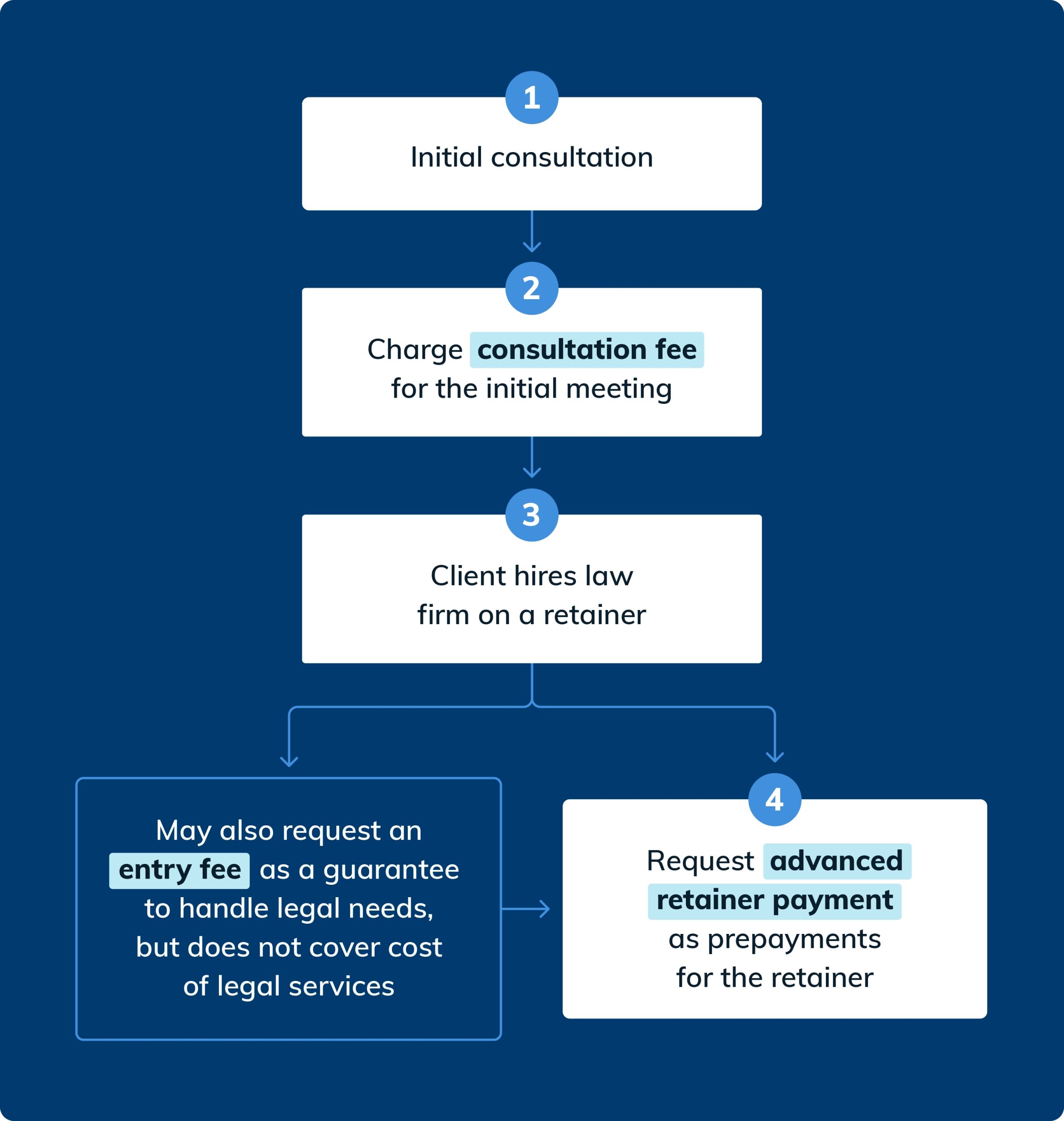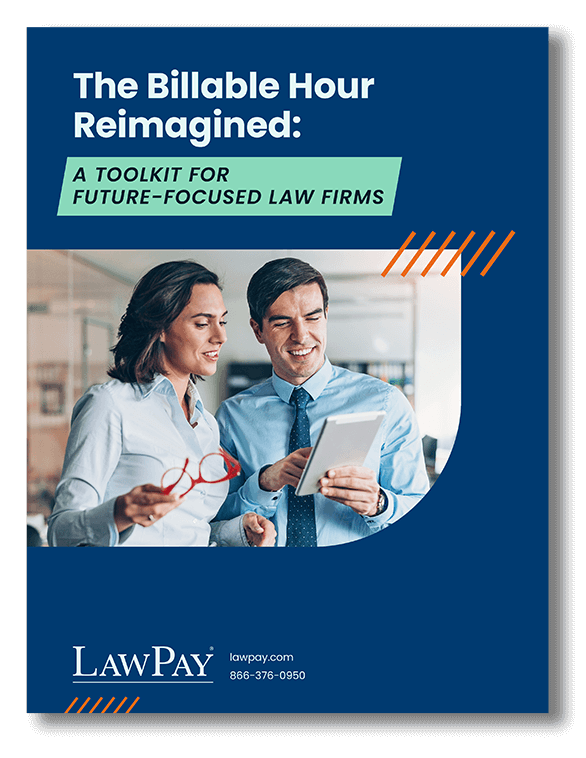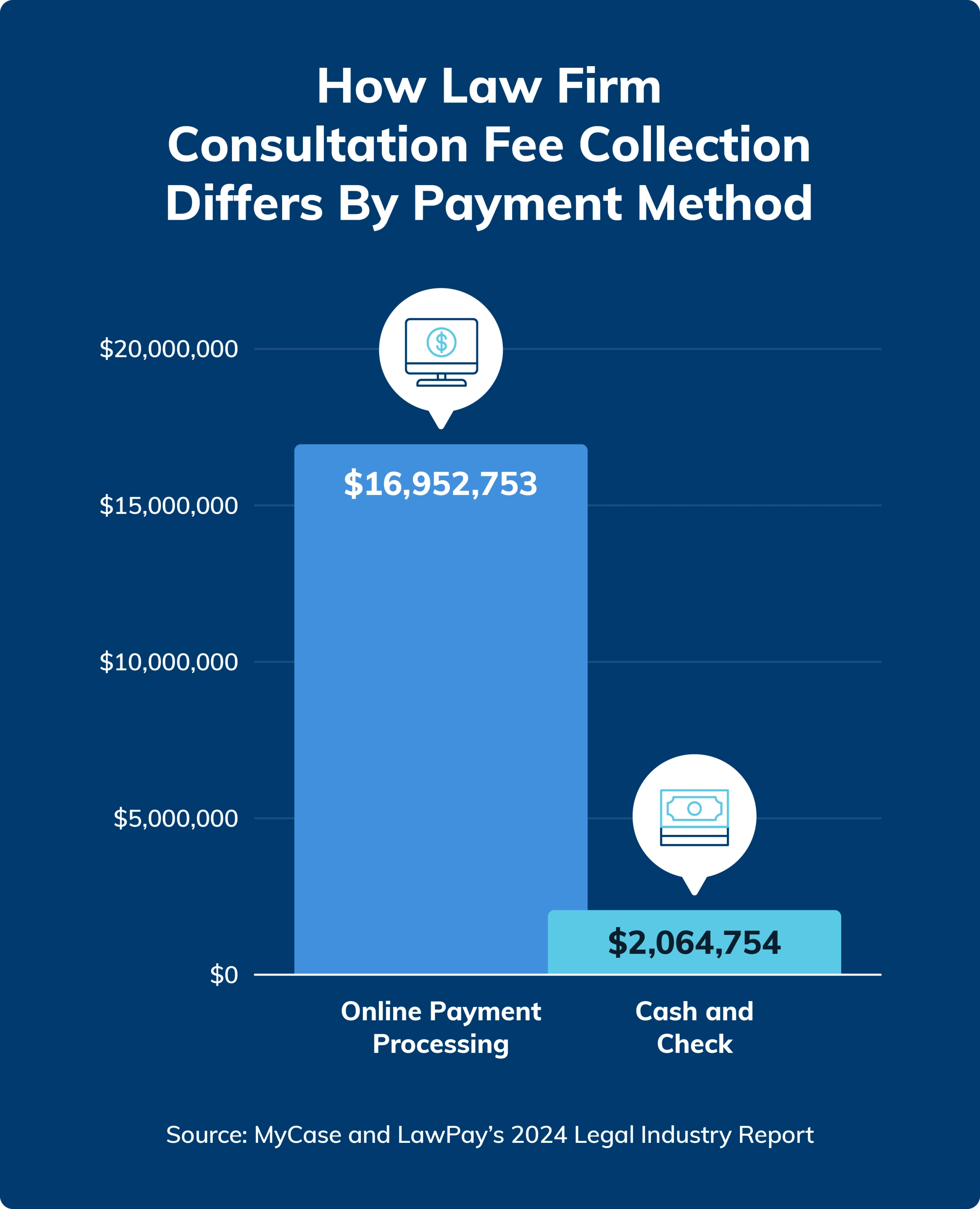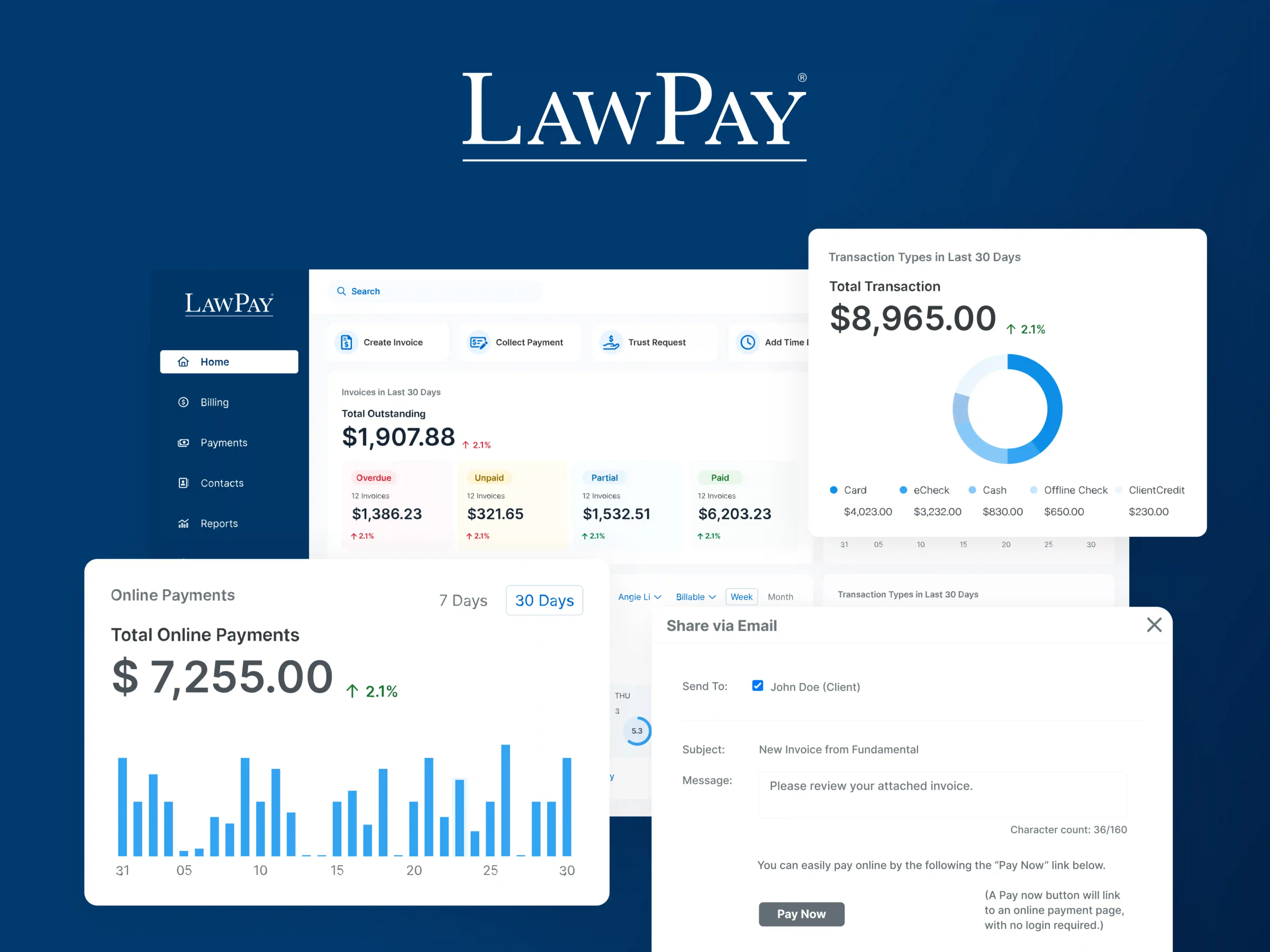The average lawyer consultation fee will vary widely depending on the law firm's practice area, geography, and pricing structure. According to our 2024 Legal Industry Trends Report, 51% of law firms charge consultation fees for the initial case review. A lawyer consultation fee can be as low as $50 or run upwards of $1,000, if not higher.
Lawyer consultation costs have a variety of pros and cons that law firms must consider when determining whether to charge for the first consultation or to offer a free initial case review for prospective clients. For example, charging consultation fees can potentially reduce the number of introductory meetings a law firm can book. However, clients who book and pay the fee may feel more inclined to retain the firm's services.
This article will provide a detailed overview of legal consultation fees, their role in how much a lawyer costs, the pros and cons of using initial consultation fees, and how a firm can establish an attorney consultation fee system.
What Is a Lawyer Consultation Fee?
A lawyer consultation fee is the charge an attorney requires a client to pay to meet with them for the first time. During the first meeting, the attorney will discuss the facts of the case, outline possible legal options, and explain the firm's fee structure if the client signs on with the firm. Lawyers can charge different rates and structures for this first meeting depending on practice area, geography, experience, and services offered during the initial consultation.
A key distinction is that consultation fees differ from retainer fees and deposits. Retainer fees are advance payments as part of an agreement to hire a lawyer for future legal services. Deposits are a broader category that covers any required upfront payments. In addition to retainers, attorneys can charge deposits for court filing fees, expert witness costs, or investigative research expenses.
A firm's lawyer consultation cost must be transparent and easily understandable. Legal consumers want to know how much a lawyer consultation fee is, and state bar associations have ethical requirements stating that lawyers cannot convey false or misleading information to clients. Therefore, if an attorney wishes to charge a consultation fee, they must clearly explain any costs that potential clients will face by attending an introductory meeting. It is best always to include these fees in written communication, but discussing them over the phone is also wise.

What Factors Determine Lawyer Consultation Fee Costs?
The costs of working with a lawyer can vary tremendously. Attorneys will weigh multiple factors when deciding how much to charge for an initial consultation. Even within the same firm, different attorneys may charge different consultation fees depending on the unique factors of each case.
Some of the most common factors that impact consultation fees include:
Practice area: Complex commercial litigation or high-stakes criminal defense consultations may demand a higher consultation fee than a firm that drafts wills and trusts.
Case complexity: A more complex legal issue may require the law firm to conduct preliminary research to prepare for the meeting. Consultation fees can help recover the expenses incurred by the firm for that work.
Geography: Firms in more urban geographies or higher-income areas may charge more in fees than firms in rural areas or lower-income areas.
Meeting length: Some law firms only offer a 15-minute initial phone consultation to decrease costs. Those initial consultations will carry a smaller price tag than a firm that provides a one-hour in-office initial consultation.
Lawyer’s experience and reputation: A lawyer building their practice may charge less consultation fees to help secure more meetings. Alternatively, an experienced or highly recognized attorney who gets plenty of phone calls can be more selective and charge higher consultation fees.
Urgency: Pressing legal matters that require a law firm to move quickly for a client may demand more fees than a firm with a more relaxed timeline.
Consultation Fee Structures
A firm may use several different consultation fee structures, but before selecting one, it should determine what services to include in the initial consultation. Assessing the level of work and service the firm wishes to provide makes selecting a fee structure easier.
The most common types of consultation fee structures include:
Flat-fee rate: The firm charges a standard, single rate for an initial consultation. Lawyer flat-rate fees are good for both parties as prospective clients know what the meeting will cost. Flat-fee structures work best with a pre-determined meeting time, such as 30 or 60 minutes.
Hourly rate: Attorneys commonly bill hourly rates for legal services, and the client will pay depending on the meeting’s length.
Sliding-scale rates: Also called a tiered consultation rate, a law firm may offer this alternative law firm fee for the first consultation. A sliding-scale rate allows clients to customize their experience by choosing the service level they want to receive, while the firm charges a fee rate commensurate with the work provided.
Free consultation: Most of this article has talked about consultation fees, but it is worth noting that nearly half of all law firms offer free consultations. Free consultations are especially common for personal injury law firms and firms that bill on contingency.
Beyond a fee structure, law firms must also determine how they will apply the consultation fee to those who transform from a potential client into an actual client. These options include:
Standalone fee: A firm may say the consultation fee is a separate payment. The consultation fee charges would not apply to any future legal services.
Future credit: If the client hires the lawyer, the consultation fee may be credited to the client’s account. For example, an attorney charges $250 for the consultation and hires a client. That credit would give the client a $250 deduction off their first bill or retainer.
Refundable upon retention: A lawyer may opt to refund some or all of the consultation fee if the prospective client signs a retainer agreement with the firm.
Pros and Cons of Charging Lawyer Consultation Fees
Lawyers who charge for consultations can get compensation for the time and energy spent preparing and executing an initial consultation. Additionally, the consultation fee acts as a down payment for a retainer, which may make conversion easier for the lawyer.
These benefits are not without their downsides. The number of clients who schedule an initial consultation will likely drop, and that reduction could be substantial if many of the firm's competitors are lawyers who offer free consultations. Clients who pay a consultation fee may also have higher expectations in terms of service and results.
A law firm must consider all of these elements to calculate whether consultation fees will improve the profitability of its practice.
Pros | Cons |
|---|---|
Reduce low-value calls from people who want free advice. | Fees may discourage potential clients from initially reaching out. |
Receive guaranteed compensation for the first meeting. | Clients may have higher service and performance expectations. |
May encourage clients to sign a retainer agreement. | Attorneys may need to spend extra effort justifying the fee. |

Best Practices for Setting Up Attorney Consultation Fees
Law firms should develop a fair and transparent system for their clients while providing adequate revenue for the resources used before and during the consultation.
Consider the following best practices when establishing a legal consultation fee system:
Review local regulations: Confirm with your state bar association’s guidelines around consultation fees to ensure full compliance.
Define the parameters of the initial consultation: Tell potential clients in writing how much the meeting will cost, how long the meeting will be, and the types of information you will discuss.
Help staff highlight the value of consultation fees: Prospective clients will call asking why some lawyers charge for a consultation. Equip your intake staff with talking points that address these concerns and help encourage conversion. One idea is to highlight that an attorney will research the client’s case and provide possible solutions during the initial consultation, thereby promising tangible takeaways during the meeting.
Make payment easy: A consultation fee is a barrier for clients; providing multiple payment options helps reduce its impact and can improve overall collection rates. Consider offering an online payment platform to supplement cash and check receipts. LawPay customers collected nearly $17 million from online payments for consultation fees compared to $2 million collected via cash and check.
Track and evaluate results: After six to 12 months, check back to see what impact the consultation fee had on initial consultation volume, signed clients, conversion rate, and revenue generated from consultation fees. These metrics will help you gauge the effectiveness of the consultation fee system and whether further adjustments are needed.

Efficiently Collect Consultation Fees With LawPay
Legal consultation fees can be an excellent way for firms to add supplemental revenue to their budgets. However, collecting fees, especially from prospects who do not sign on with the law firm, is not always easy. A technology platform designed around the needs of today’s legal consumers and law firms can help solve the problem of collections.
LawPay’s legal payment management solutions make it easier for clients to pay their consultation fees. Faster bill payment means law firms recover revenue and close accounts more quickly.
To see how LawPay can simplify collections for your firm, schedule a demo with our team today.
Schedule a demo to see what LawPay can offer your firm.
Get a demo
About the author

Esther ParkContent Writer and Senior SEO Manager8am
Esther Park is a Content Writer and Senior SEO Manager at 8am. Her expertise lies in writing about emerging legal technologies and financial wellness strategies for law firms, among other topics.
